Key takeaways:
- Tracking spending helped identify financial patterns and areas for improvement, leading to better budgeting.
- Creating an emergency fund improved peace of mind during financial stress and unexpected expenses.
- The “pay yourself first” strategy fostered a sense of security by automatically saving a portion of income.
- Utilizing visual budgeting tools and ongoing education through courses and podcasts enhanced financial literacy and motivation.
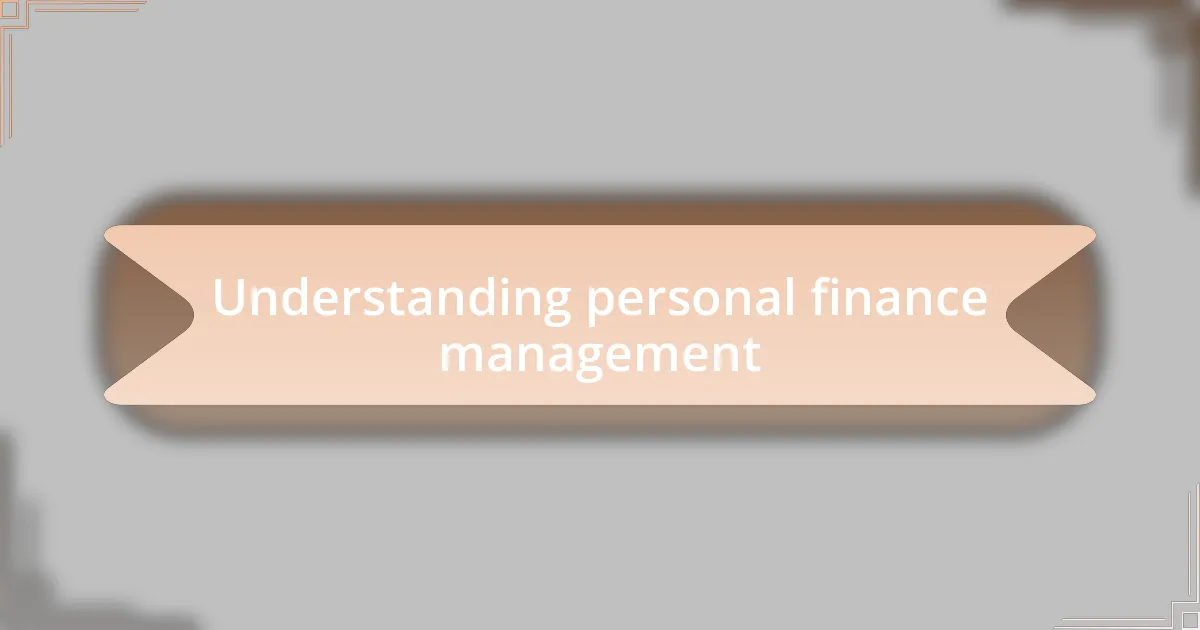
Understanding personal finance management
Personal finance management is essentially about making informed decisions to control your money. I remember a time when I felt overwhelmed by bills and expenses; instead of panicking, I decided to track every dollar I spent. This simple act opened my eyes to where my money was actually going, revealing patterns I hadn’t noticed before.
The concepts of budgeting, saving, and investing can seem daunting, but they don’t have to be. Have you ever thought about your financial goals? When I started setting clear, achievable goals, my approach shifted from reactive to proactive. It was liberating to plan for a vacation or to save for emergencies, knowing that I was in control of my financial future.
Understanding personal finance is not just about numbers; it’s about building a mindset that prioritizes financial well-being. I often ask myself, “What do I truly value?” This reflection leads to better choices, aligning my spending with my priorities, which ultimately brings a sense of peace and satisfaction to my financial journey.
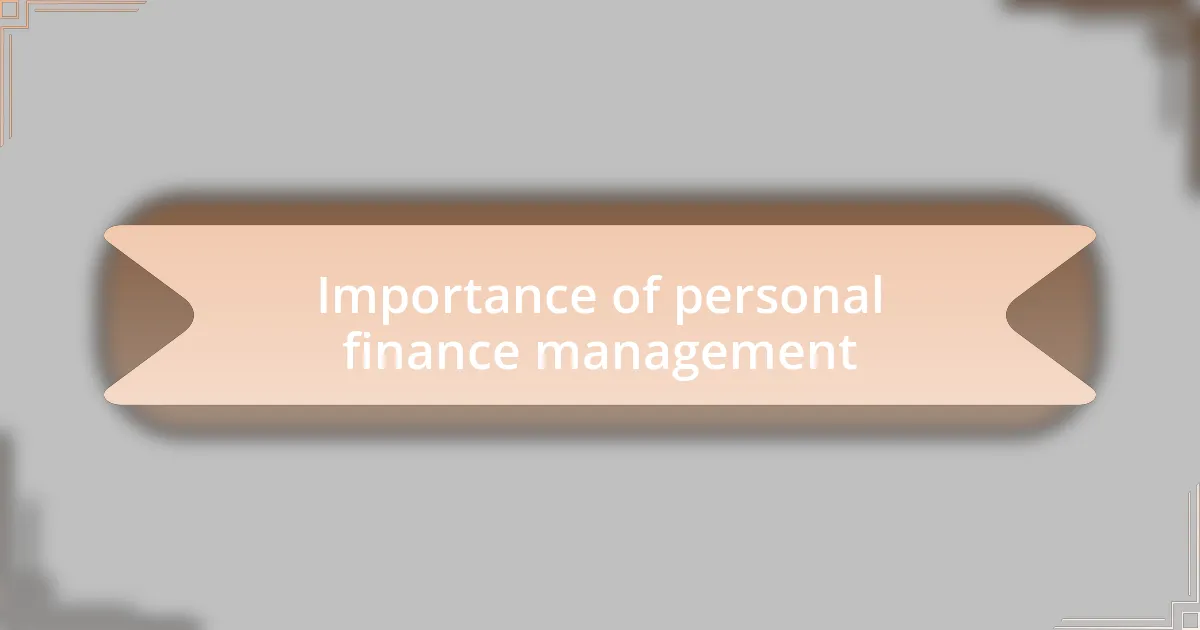
Importance of personal finance management
Effective personal finance management is crucial for achieving financial stability and reducing stress. I recall a period when unexpected expenses threw my budget into chaos, making me feel anxious and trapped. It was then that I realized how important it is to have an emergency fund; knowing I had a safety net drastically improved my peace of mind.
In my experience, the emotional impact of managing finances cannot be overstated. I remember meeting a friend who stressed constantly about money, and it was clear that lack of control affected other areas of her life. She had not yet grasped that budgeting isn’t just a chore; it’s a tool for empowerment, helping us make informed choices that lead to a more fulfilling life.
Having a solid personal finance strategy fosters a sense of accomplishment and security. Think about your own experiences—how did it feel to reach a savings milestone or pay off a debt? Celebrating these small victories builds confidence, motivating us to continue on the path toward our financial goals. Personal finance management is not merely about numbers; it’s about creating a life that aligns with our values and aspirations.
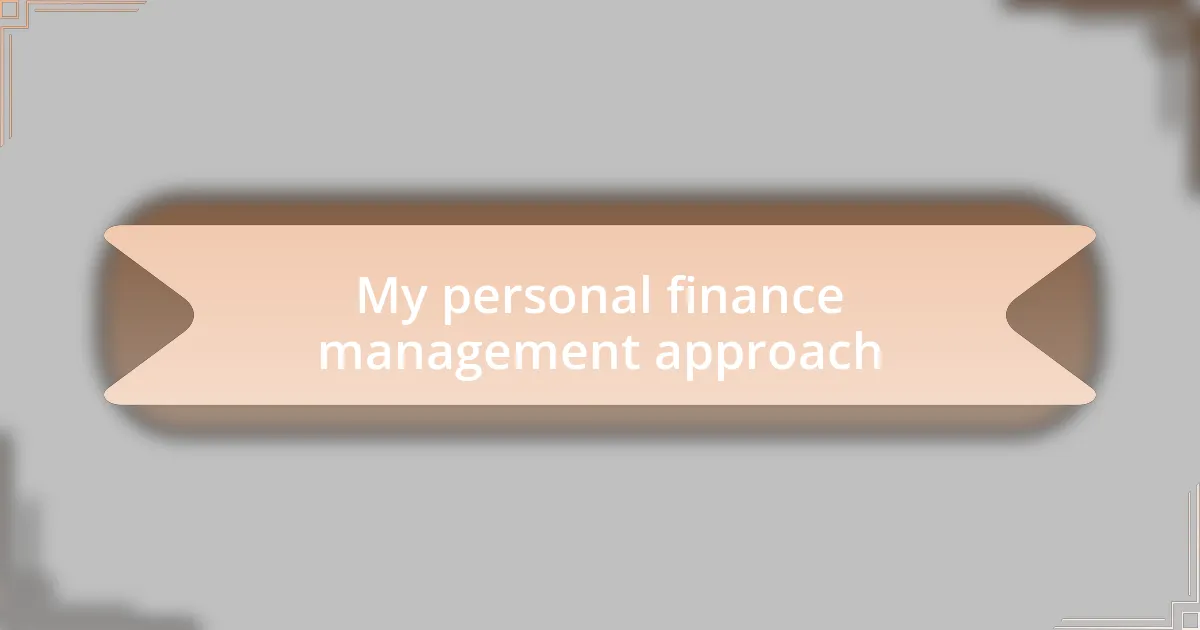
My personal finance management approach
In my personal finance management approach, I prioritize creating a detailed budget that reflects my lifestyle and goals. I remember the first time I sat down with pen and paper, tracking my income and expenses meticulously. It was eye-opening to see where my money was really going and identify areas for improvement. Have you ever experienced that moment of clarity when you realize your spending habits don’t align with your priorities? It’s a crucial step in taking control of your finances.
Another key aspect of my approach is regular review and adjustment of my financial plan. Life changes, and so do financial responsibilities. There was a time when a job loss made me reassess how I allocated my resources. I learned the importance of being flexible—adjusting my budget not only helped me survive during tough times, but also empowered me to re-strategize for the future. How often do you revisit your financial goals? This practice keeps me motivated and intentional about reaching my milestones.
Additionally, I’ve found that educating myself about personal finance concepts significantly enhances my management skills. It’s not just about following a formula; it’s about understanding the ‘why’ behind my decisions. For instance, diving into investment principles transformed my perception of wealth-building. Have you ever taken the time to learn about how compound interest works? Gaining that knowledge made a world of difference in my strategy and gave me confidence as I explored new options for growth.
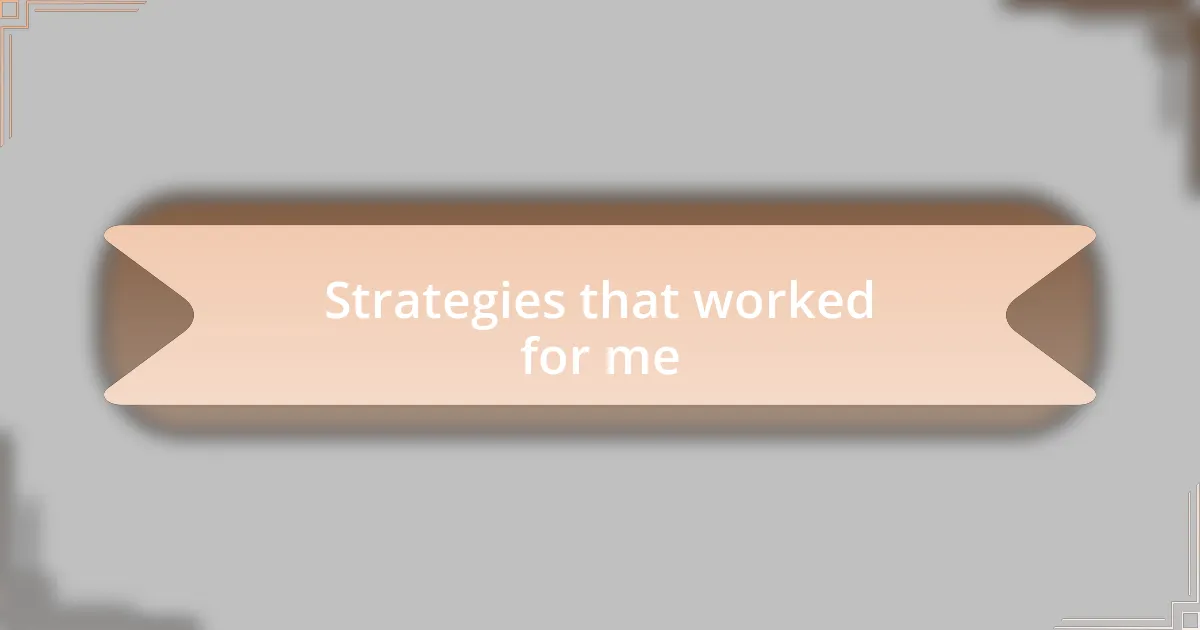
Strategies that worked for me
Tracking my spending became a game-changer for me, especially when I started using smartphone apps. I still recall the surprise I felt when I categorized my monthly expenses. I had no idea how much I was spending on coffee runs! Have you ever wondered how those small daily expenses add up over time? That realization prompted me to set specific limits for certain categories, and that simple act has significantly bolstered my savings.
Another strategy that has served me well is the “pay yourself first” approach. I remember the first month I implemented this; I automatically transferred a portion of my paycheck into a savings account before touching anything else. It felt a bit strange at first, like I was depriving myself, but it quickly became a rewarding habit. How often do you prioritize your future over your immediate wants? That shift in perspective not only helped me build a safety net but also brought a sense of security I hadn’t felt before.
Lastly, I noticed that surrounding myself with supportive financial-minded friends created a positive accountability network. I recall sharing goals with my close circle and how that fostered inspiring discussions about money management. Have you experienced the impact of engaging conversations around finances? Hearing others’ experiences and strategies not only motivated me but also offered fresh perspectives I hadn’t considered before. This collaborative spirit has truly enriched my personal finance journey.
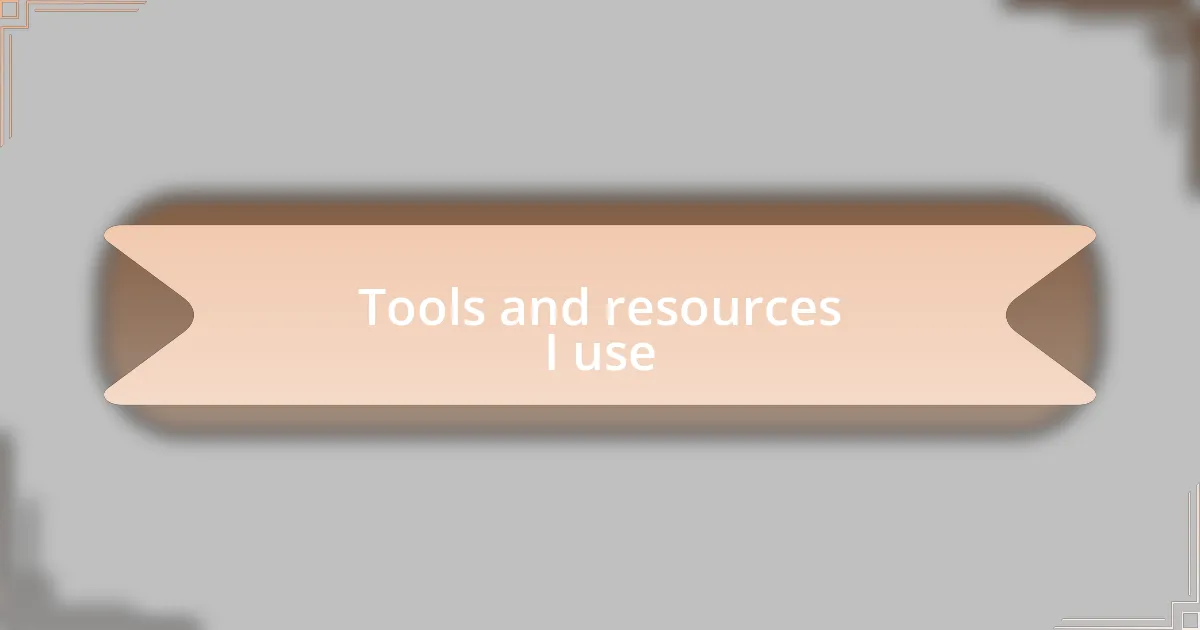
Tools and resources I use
Using budgeting tools has been pivotal in my financial journey. I still remember the first time I discovered a budgeting app that allowed me to sync my bank accounts. It felt like having a personal finance coach in my pocket! Seeing my spending in real-time and in clear visual graphs truly helped me understand where I was overspending. Have you thought about how visualizing your finances could change your outlook on saving?
Another resource I swear by is online courses focused on personal finance. I took a comprehensive course on investing last year, and it opened my eyes to concepts I hadn’t grasped before. I’ll never forget the moment I finally understood the power of compound interest. It was like a light bulb went off, and I realized that even small investments could grow significantly over time. Have you ever had that moment where everything just clicks?
Lastly, I love utilizing podcasts as a tool for ongoing education. Listening to financial experts discuss various topics while I commute has made learning about finance enjoyable for me. I often find myself nodding along, taking mental notes, and even pausing to jot down ideas in a notebook. Who knew that enriching my financial literacy could feel so seamless? That constant stream of information keeps me motivated and inspired to take actionable steps in my financial journey.
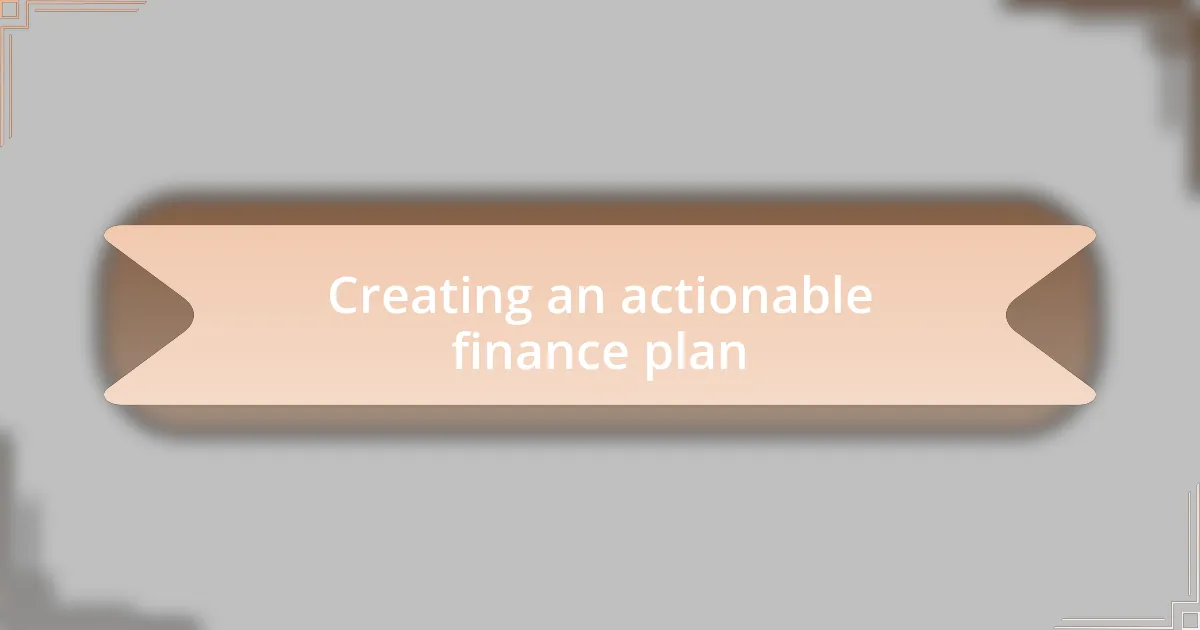
Creating an actionable finance plan
Creating an actionable finance plan requires clear goals and a defined strategy. When I first started outlining my financial objectives, I sat down and wrote everything out. I recalled how empowering it felt to specify my goals: saving for a vacation, building an emergency fund, and even planning for retirement. Have you ever set a financial goal only to realize you weren’t fully committed to it? That’s where an actionable plan comes in—it’s about making those goals tangible and achievable.
Breaking down those larger goals into smaller, actionable steps has been a game changer for me. For instance, instead of just saying I want to save for a vacation, I calculated how much I’d need to set aside each month. The moment I transferred that first amount into my dedicated savings account, I felt a sense of accomplishment. Have you experienced that shift from feeling overwhelmed to feeling in control? Developing those individual steps not only made the goal seem more attainable, but it also kept me motivated along the way.
Tracking my progress consistently has solidified my finance plan. I usually dedicate a few minutes each week to review my budget and adjust as needed. This habit has instilled a sense of accountability in me. Have you considered how regularly checking in on your financial goals could enhance your commitment? I’ve found that those weekly reflections serve not just as a reminder of where I stand, but as a source of motivation to keep pushing forward. Celebrating even the smallest milestones has turned this journey into a rewarding experience.